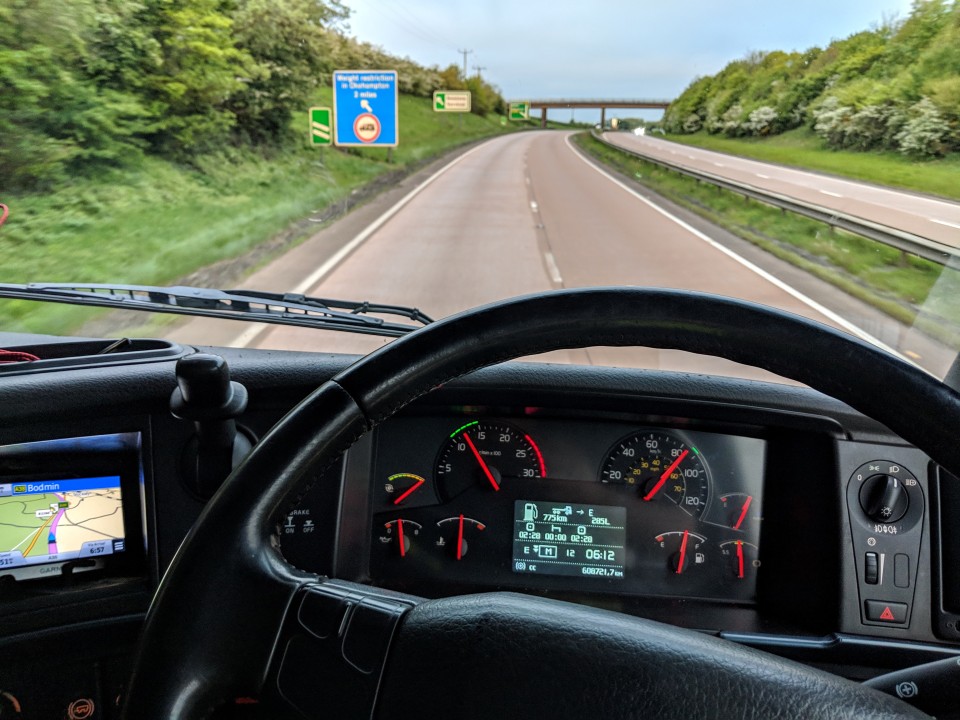
Susie Jones
Cómo ser un camionero sano
Creado: 27/08/2024
•
Actualizado: 27/08/2024
Como profesión exigente, la conducción de camiones implica a menudo largas jornadas, un estilo de vida sedentario y largos periodos fuera de casa, lo que a menudo puede pasar factura a la salud de muchos conductores.
Hábitos poco saludables como el consumo de comida rápida, la falta de actividad física y unos patrones de sueño perturbadores pueden acarrear posibles complicaciones de salud en el futuro. Pero, ¿cómo mantenerse en forma como camionero? Es más fácil decirlo que hacerlo, pero hemos recopilado una lista de consejos que le ayudarán a mantenerse en plena forma mientras conduce.
Seis consejos para mantenerse sano en la carretera
1.Hidratación
Un consejo sencillo y un bien que a menudo damos por sentado, sin embargo, la mayoría de los problemas de salud se producen por deshidratación. Los sorbos regulares de agua o caldo a lo largo del día expulsarán los residuos metabólicos y las toxinas de su sistema y le mantendrán con más energía y alerta. Llevar siempre encima una botella de agua recargable no sólo le recordará que debe mantenerse hidratado, sino que además es mejor para el medio ambiente.
2.Dieta
La tentación de la comida rápida después de un largo día es algo con lo que todos podemos identificarnos, sin embargo, al igual que mantenerse hidratado, su dieta juega un papel importante en su salud, así como en cómo acabará sintiéndose a lo largo del día.
Se recomienda que los camioneros coman de tres a cuatro veces al día, ya sea dos comidas y dos tentempiés o dos comidas y un tentempié. Intente mantener un plan de comidas y tentempiés con alto contenido en omega-3, hierro y vitamina C, como verduras de hoja verde, pescado y frutas. Evite el consumo frecuente de alimentos y bebidas como la pasta, el pan, las bebidas dulces y los estimulantes como el café y las bebidas energéticas.
Consulta nuestra lista de tentempiés saludables para llevar en el taxi:
Barritas de cereales
Barritas energéticas
Palomitas de maíz
Nueces
Frutos secos
Chocolate negro
Además de comprar comida sana cuando se está de viaje, a veces puede ser más sano y rentable preparar la comida. Frieghtech tiene una fantástica selección de recetas que te ayudarán a mantener una dieta sana mientras trabajas.
3.Sleep
Debido a la naturaleza del trabajo, dormir lo suficiente puede ser difícil para un camionero y puede tener resultados devastadores para todos en la carretera.
Unos sencillos consejos y trucos como los siguientes pueden ayudarle a dormir bien por la noche:
Cree un ambiente en la cabina que le haga sentirse como en casa. Consulta nuestro post sobre cómo hacer de la cabina de tu camión un hogar.
Mantenga a oscuras la zona donde duerme
Una ducha caliente: Utilice nuestra página mapas para saber qué paradas de camiones ofrecen este servicio.
Pruebe algunas aplicaciones que le ayudarán a dormir
Encuentre el lugar ideal para aparcar sin ruidos ni molestias. Nuestra aplicación intruck le ofrece 5.000 ubicaciones para vehículos pesados en toda Europa, mientras que nuestro equipo SNAP Access and Security puede ofrecerle soluciones de seguridad personalizadas que le permitirán dormir mejor sabiendo que usted y su camión están seguros.
4.Ejercicio
Uno de los consejos más difíciles de seguir cuando se está de viaje, pero no por ello menos importante. Estar sentado muchas horas al día puede provocar malas posturas, dolor de espalda y posibles complicaciones de salud. Después de un largo día al volante, puede resultar tentador sentarse y relajarse; sin embargo, unos 15 minutos de actividad rápida, como caminar o estirarse, pueden hacer que se sienta rejuvenecido y menos estresado.
HMD Trucking tiene algunos ejercicios útiles adaptados a los camioneros si desea incorporar varios tipos de ejercicio físico a su rutina.
5. Vitaminas
Estar de viaje a tiempo completo puede dificultar la ingesta de todas las vitaminas necesarias. Tomar un multivitamínico cada día puede reforzar tu sistema inmunitario y ayudarte a mantenerte sano.
6.Salud mental
Sabemos que cuidar la salud física en la carretera es importante, pero ¿cuánto tiempo dedican los camioneros a cuidar su salud mental?

La organización benéfica Mind, dedicada a la salud mental, publicó estadísticas que revelan que el 30% de las enfermedades profesionales autodeclaradas en el sector del transporte y la logística se deben a la ansiedad, la soledad, el estrés y la depresión. También se da a entender que esta cifra podría ser mayor, ya que la mayoría de la gente no busca la ayuda que necesita. Además, el 95% de las personas que se dan de baja por enfermedad no explican el motivo real de su ausencia del trabajo si se trata de su salud mental.
Seguir estos consejos y trucos puede tener un efecto positivo en su salud mental. Además, es importante mantener conversaciones abiertas y sinceras con otros camioneros, supervisores o expedidores.
¿Puede el ejercicio hacerte mejor conductor?
Un estilo de vida saludable no sólo mejora la salud mental, sino que también puede mejorar la conducción. Un estudio demostró que los conductores a los que se pedía que hicieran ejercicio a diario manifestaban una mayor facilidad para girar la cabeza, eran capaces de girar más el cuerpo y podían entrar más rápidamente en el coche.
¿Qué es lo más duro de ser camionero?
Las largas jornadas parecen ser uno de los aspectos más duros de la conducción de camiones. Los camioneros se enfrentan a menudo a largos kilómetros que recorrer y a horarios antisociales. Estos largos kilómetros y horas antisociales pueden conducir a un estilo de vida poco saludable.

¿Es poco saludable ser camionero?
Debido al estilo de vida de muchos camioneros, estadísticamente son más propensos a tener problemas de salud en comparación con otras profesiones. Los camioneros se enfrentan a menudo a algunos obstáculos, como espacios de trabajo reducidos, situaciones estresantes, patrones de sueño inusuales y falta de alimentos nutritivos, que influyen en su salud.
Mantener un estilo de vida saludable como camionero requiere un esfuerzo consciente, pero los beneficios de hacerlo merecen la pena en general. Los consejos anteriores le permitirán tomar el control de su salud y mejorar su bienestar. Esté atento a más consejos y trucos que le ofreceremos en SNAP.



